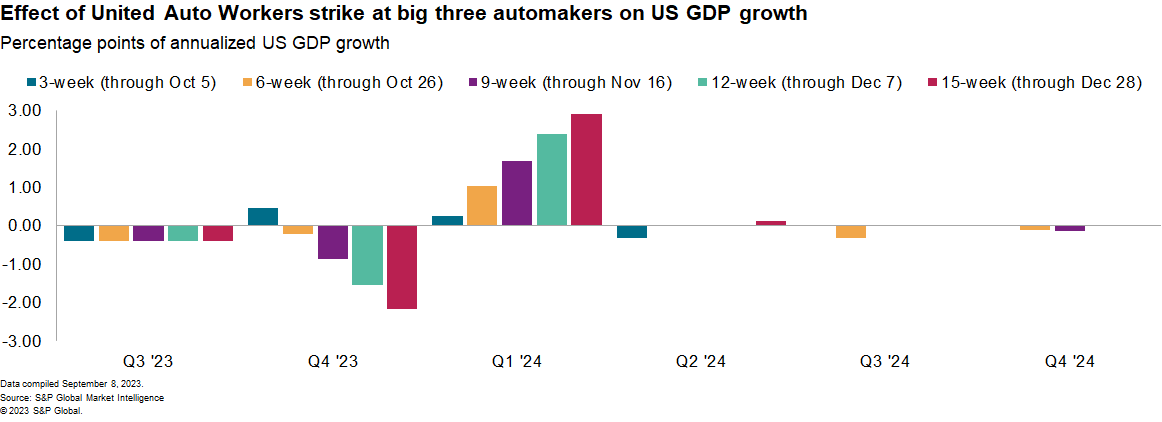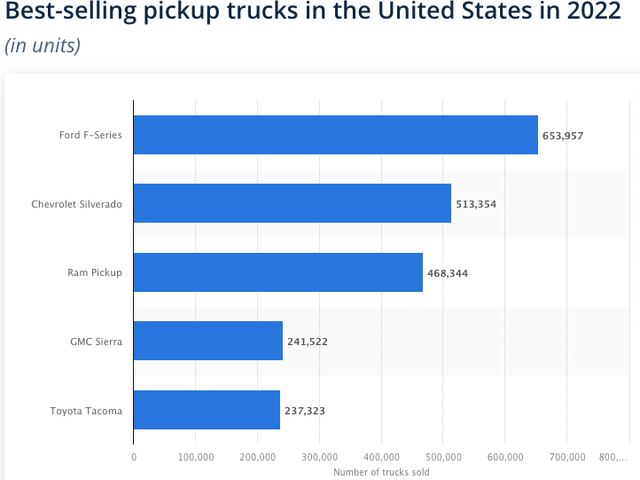
Last October, when Ford Motor Company (NYSE:F) stock settled below $10, I went against the grain and added to my long position as I thought the company was selling for a bargain courtesy of a mispricing by Mr. Market. A lot has happened since then, including an agreement to end UAW strikes that would cost Ford $8.8 billion over the contract period, which ends in 2028.
A few Seeking Alpha analysts have already covered the details surrounding the new UAW contract, so I am not planning to dive into those details. In this analysis, I will try to answer a question asked by many Ford investors and followers; why is Ford stock cheap?
Why Is Ford Stock So Cheap?
If I told you that there is a company that has reported double-digit revenue growth in the last four quarters, is profitable, pays a dividend that yields over 5%, and is valued at a forward P/E of 6, I’m sure many of you would want to have a look at this company. Ford is that company. As a shareholder of the company, I wanted to find the reasons behind Ford’s seemingly cheap valuation, and I identified three main reasons.
First, the short-sighted nature of stock markets. Ford, along with its Detroit peers, has faced many challenges in the recent past, with the biggest challenge being UAW strikes.
I am not trying to undermine the impact of UAW strikes. The strikes were announced on September 15 and lasted just over six weeks through October 30 until the UAW finally gave the green light for union employees to get back to work after reaching deals with the Big Three automakers. As illustrated below, S&P Global projects these strikes to hurt GDP growth in the current quarter.
Exhibit 1: The impact of UAW strikes

S&P Global
Looking beyond, we see that these strikes will not have a negative impact on long-term economic growth.
Coming to Ford, the new deal with the UAW will cost the company money, there’s no denying that. Ford CFO John Lawler, discussing the outlook for the company at the Barclays Global Automotive and Mobility Tech Conference on November 30, pledged to offset the negative impact of this cost increase through higher productivity and cost reductions.
I am not inviting investors to take the CFO’s promises as they are, but I believe the market sentiment toward Ford stock has deteriorated more than what the new UAW deal calls for, which does not come as a surprise as Mr. Market tends to overreact in the short term.
Ford also had to deal with plant shutdowns, rising material costs, and quality issues at production plants this year, which have all contributed to the negative sentiment toward the company.
Again, I am not trying to undermine the impact of any of these challenges, but none of these materially changes my investment thesis for the company which is centered around Ford emerging as a leading EV maker in the U.S. with a focus on EV trucks.
Second, the expectations for a highly competitive EV truck market have kept Ford’s valuation under pressure. This is a valid concern, with Tesla’s (TSLA) Cybertruck finally moving into the market. I will go out on a limb to say that these fears are overblown as I believe Ford’s electrification strategy, if executed well, will overcome competitive threats posed by new-age carmakers including Tesla.
Exhibit 2: F-150 Lightning vs Cybertruck
Jerry
Tesla, as a tech-first carmaker, has a lot to offer car owners. However, I believe Americans’ love for macho trucks stems from the fact that they represent what we can think of as the American spirit. In addition to the functionality of these trucks, the looks matter too. And by looks, I mean these trucks’ masculine, macho finish.
Pickup trucks have dominated passenger car sales in America in the last five decades, and I believe the slow adoption of EVs in the U.S. compared to Europe and China has a lot to do with the unavailability of electrified trucks. I think the Cybertruck will be successful in the U.S. and even more so in Europe, but I do not see Tesla serving Americans’ love for pickup trucks.
Exhibit 3: Best-selling pickup trucks in the U.S. in 2022

Statista
I am sure many of you are familiar with these trucks, but to add a little more context to all readers, I will share some photos of these trucks to show what Americans love today when they go to an auto dealer to purchase a new vehicle.
Exhibit 4: Ford F-150 2023

Edmunds
Exhibit 5: Chevy Silverado 2023

Edmunds
Exhibit 6: Ram Pickup 2023

Edmunds
I guess you see a pattern here. These trucks look macho – I am highlighting this yet again as I believe looks play a massive role in the purchasing habits of passenger vehicles. Tesla and other new-age carmakers, in my opinion, will carve out a market of their own but will not replace – not in the foreseeable future at least – the demand for best-selling pickup trucks in the U.S. today as long as these vehicles are electrified in the next few years.
Fears of increasing competition crippling Ford’s EV segment growth, in my opinion, are overblown. When Ford’s EV segment thrives amid competition – which is my base-case scenario for 2024 – I believe we will start seeing Mr. Market being more generous toward Ford stock.
Third, concerns about Ford’s inability to grow have lingered on for so long, exerting pressure on the company’s market valuation. These concerns, in my opinion, have masked the growth the company’s EV segment has seen in recent quarters. For some context, in November, Ford sold 4,393 F-150 Lightning trucks, which is higher than the 3,503 EV trucks the company sold in the entire Q3. In total, Ford sold 8,958 EVs in November, with the Mach-E also performing well.
The company has announced strategic production cuts to address the softening demand in the market, including a decision to slash F-150 Lightning production by half. Not what investors were expecting, but this is not a problem faced by Ford alone. Some companies may decide to aggressively lower the price of their EVs – which we have already seen from Tesla – while others may pursue a blended strategy of reducing prices and cutting production. It also seems fair to conclude that some automakers have gotten ahead of themselves by aggressively expanding vehicle production.
Ford’s decision to slow production of EVs will likely reflect positively on the company’s bottom line as the EV segment is loss-making. However, as a long-term-oriented investor, I will keep an eye on the industry dynamics to evaluate whether this decision will destroy shareholder wealth in the long term if it opens doors for other carmakers to gain ground.
While there are concerns, I don’t agree with the market’s premise that Ford’s growth story is flawed. I believe the company has a real chance to see solid growth in the coming years with its EV trucks gaining traction.
Takeaway
Ford is cheaply valued in the market for a few reasons. I expect most of these reasons to have a negligible impact on the company’s long-term growth potential. Therefore, I believe Ford stock is an attractive bet at these prices, but I also believe that a lack of catalyst will limit upside potential in the short term.
Read the full article here












Leave a Reply